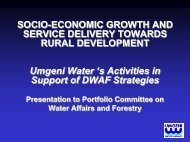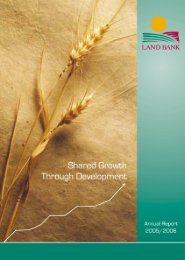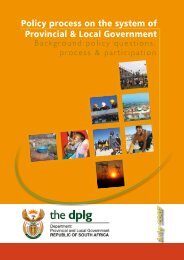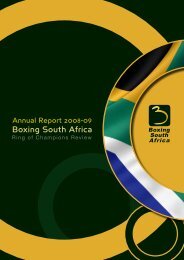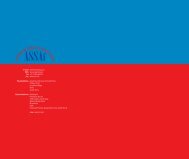3. PPECB Annual Report 2009-2010
3. PPECB Annual Report 2009-2010
3. PPECB Annual Report 2009-2010
Create successful ePaper yourself
Turn your PDF publications into a flip-book with our unique Google optimized e-Paper software.
The Harmonization Programme continued to develop itssystems on consistency with the introduction of Port Auditingand Troubleshooting sporadically pursued at critical controlareas of the <strong>PPECB</strong> inspection system. In an endeavour toalleviate risks associated with South African exports, thiscomponent of the programme is aligned to the inspectiondelivery stream and provided some prolific results in combatingnon-compliance and possible inconsistency in the process.The annual review of standards and intense discussionsamongst specialists, coupled with practical sessions forstandardising specialists, formed the basis of uniforminterpretation and application of technical instructionsinternally. The <strong>2009</strong>/10 year also marked the very firstharmonization session between <strong>PPECB</strong> and container depots,thereby harmonizing the inspections of key defects eminenton refer containers. The Harmonization Programme, withits continued philosophy of learning and innovation, hasintroduced no less than 8 <strong>PPECB</strong> packhouse demonstrationsin various table grape areas attempting to harmonize theinterpretation of quality standards applied at packhouse levelat the <strong>PPECB</strong>.Concerning International Standards development, the <strong>PPECB</strong>has attended at 3 international meetings on product qualitystandards. These meetings included both workgroup andplenary meetings of the OECD in Paris, the UNECE SpecialisedSection for Fresh Fruit and Vegetables in Geneva, Switzerlandand the bi-annual attendance of the UK HarmonizationMeeting in Reading, London. The <strong>PPECB</strong>’s contributiontowards these meetings have been paramount consideringthe deregulation of standards within the EU mid <strong>2009</strong>,re-affirming the importance of standards benchmarkingcritical for market access. The attendance of these meetingsallowed also for sustaining networks with international policymakers and import authorities in lieu of the EC 1580accreditation for the South African inspection systemrecognized within the EU.The year under review highlighted the hosting of the inauguralInternational Harmonization Workshop on CommercialQuality Standards for African Countries. Partnering with theUNECE and DAFF on this initiative, the <strong>PPECB</strong> delivered awell organised event of international quality; at the forefrontof this workshop being the objectives of capacity buildingof the emerging region within Southern Africa and the restof the continent, including capacitating the South Africansmall scale sector; a venture supported by the NAMC. Thisworkshop saw the attendance of 18 countries within thecontinent of Africa as well as 22 small scale farmers withinvarious parts of the country across different product types.To continue building on the objectives of this workshop, theHarmonization Programme pursued further capacity buildinginitiatives amongst the same constituencies, involving thesame farmers during its first <strong>PPECB</strong> packhouse demonstrationson citrus fruit product quality standards during <strong>2010</strong>.Programme: Inspection ServicesDuring the <strong>2009</strong>/10 Financial Year, the certification deskaround the country processed 60 427 certificates, a significantincrease of 12,7% recorded on the previous fiscal. For theduration of this period 2 780 certificates had errors andreissued and 5 326 were cancelled due to various reasons.These certificates represent just short of 200 million cartonsand in excess of 235 million kg’s of vegetables, flowers,maize, red tea and other products.<strong>PPECB</strong> has assisted DAFF in the drawing of audit samples todetermine the minimum residue levels on all export productsprior to export. During this period 10 121 samples wereanalysed in the Pretoria and Stellenbosch laboratories ofDAFF. Corrective actions were applied where exceedingoccurred.The <strong>PPECB</strong> inspection services managed to respond positivelyto all activity points with the aid of the national resourceplanning office. This office ensured that all activity pointswere manned and that mandated functions were executedsuccessfully.The Agricultural Export Technologist Programme (AETP)proved hugely beneficial to the agricultural industry as wellas <strong>PPECB</strong>. <strong>PPECB</strong> has successfully recruited new inspectorsfrom this programme into permanent posts all around thecountry. New inspector training and development continuedonce employed permanently as per the recruitment of ourinternal competency framework. Of the 22 students trainedin <strong>2009</strong>/10, 8 were successfully employed within.Programme: Cold Chain ServicesThe Cold Chain value stream members were primarilyinvolved with physical inspection of equipment, as well as



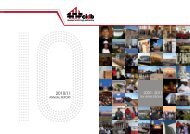
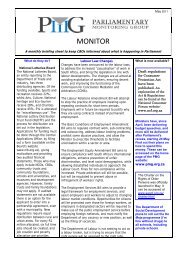
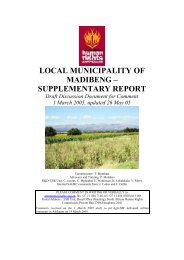
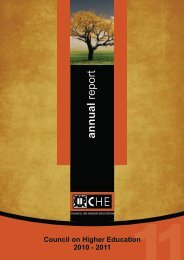
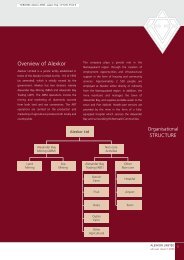
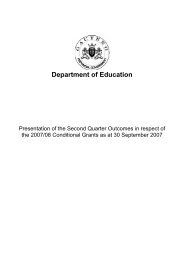
![National Research Foundation Annual Report 2008 / 2009 [Part 2]](https://img.yumpu.com/49774036/1/177x260/national-research-foundation-annual-report-2008-2009-part-2.jpg?quality=85)
